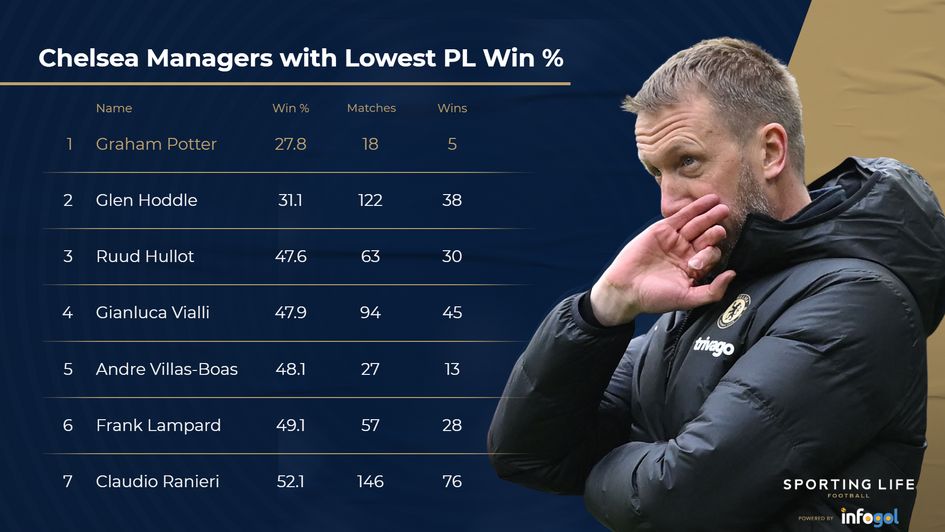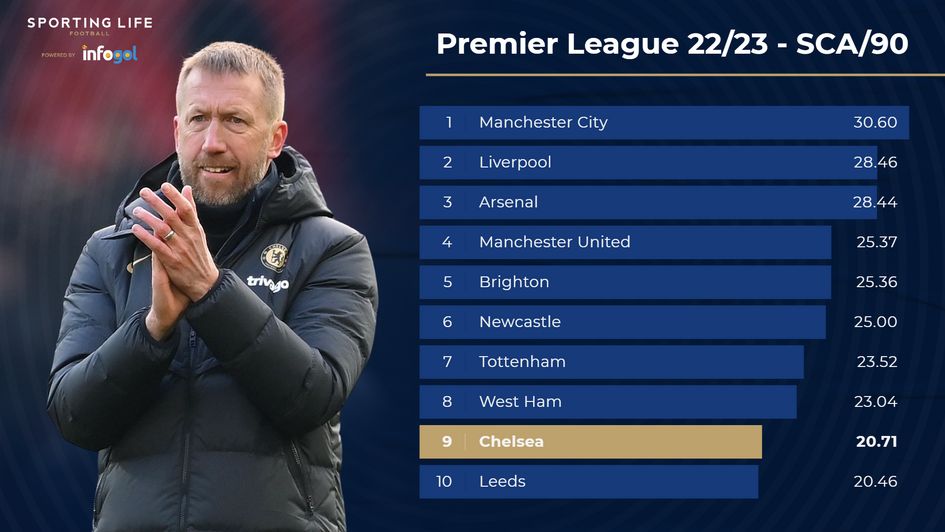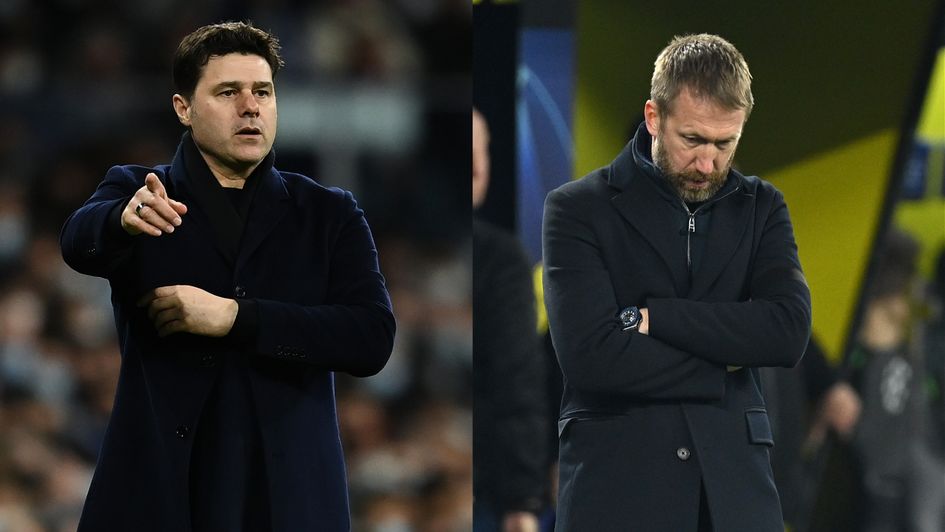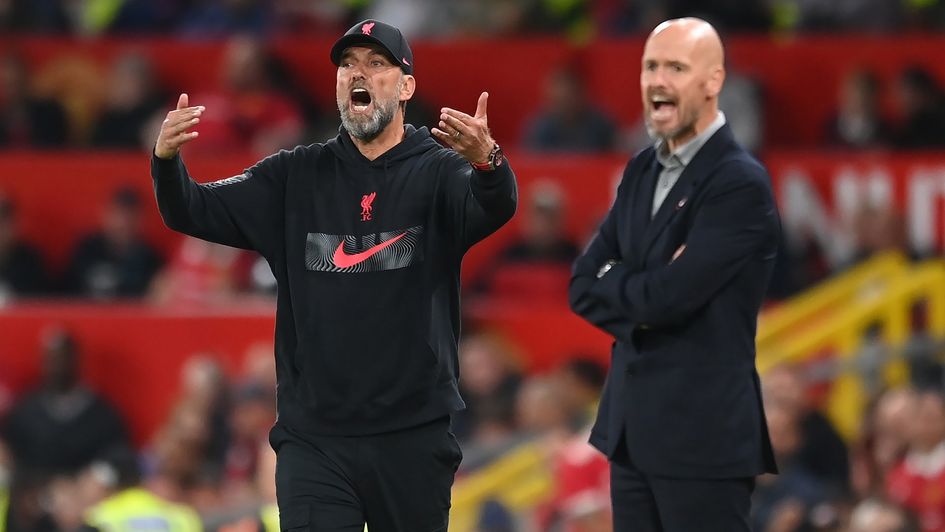Chelsea have been so deeply entangled in the messy first act of Graham Potter, in the downpour of January recruits and the painful tactical drudgery of it all, that time has flown by and his statistical record has been overlooked.
What still feels like a difficult beginning is, all of a sudden, a half-season as miserable as anything Chelsea have seen in the Premier League era.
When Jose Mourinho was sacked in December 2015, following the crisis to end all crises, he left Chelsea on 15 points from 16 games. Potter’s current record is barely better, 21 points from 18 – and things are getting worse.
Chelsea have won one of their last 11 matches and two of their last 15 in all competitions. They have scored a single goal in their last six and six in their last 15. Very few managers in the modern era have survived a run like that.

Throughout this period the sensible opinion has been to back Potter, to accept that his ultra-detailed tactical methods require time – at least a whole summer – and that the ridiculous recruitment of the Todd Boehly era is undermining his work.
This is still true, and yet over the last few weeks the disintegration of Potter’s ideas and worsening performances suggest that, through sheer bad luck and poor timing, it might be best to remove Potter and hire a different style of manager.
Potter’s possession killing creativity
According to FBRef, Chelsea produce 20.71 shot-creating actions per match, which puts them ninth in the Premier League, and average 8.75 passes into the penalty area per match, the eighth most.
These are low numbers for a team of Chelsea’s quality but even worse when considering only Manchester City, Liverpool, and Arsenal hold more than their 58.9% possession average.

In other words, it is not Chelsea’s lack of a striker that is the problem but an absence of creativity altogether: Chelsea’s xGF per game under Potter stands at 1.31, ranking them 13th.
In retrospect this may also have been the case for Potter at Brighton, because there is a flaw in xG modelling that may skew results when considering teams as patient and slow as Potter’s.
Much has been made of Chelsea’s improving xG numbers in recent weeks (they have recorded a higher number than their opponent in seven of the last ten) and yet this does not chime with the eye test.
Perhaps that is because xG does not account for the relative positions of the opponents when a shot is made, and Chelsea – like Brighton before them – may have racked up their xG with shots taken in front of a crowded penalty area.
It is plausible that a shot recorded as the same xG under Potter or Roberto de Zerbi is, in fact, very different, the former coming against a low block undisrupted by slow possession and the latter after racing into the area in space following a vertical passage of play.
Certainly, it is true that Potter’s Chelsea have been too slow and ponderous and, what’s worse, the issue is exacerbated by low confidence coupled with Potter stripping back his tactical complexity as he helps new players settle.
Static formations shifting fortunes
At first, Chelsea deployed the hybrid formations that were so crucial to Brighton surprising their opponents, with wingers becoming wing-backs in different phases of play to switch Chelsea from a back four to a back five.
But as performances declined and new faces poured in Potter decided to simplify, and throughout most of 2023 he has used a simple – and therefore rigid – 4-2-3-1 that makes the players shuffle slowly and predictably, made worse by the tension that comes from low self-belief.
As if that wasn’t bad enough, the basics of Potter’s 4-2-3-1 seem to encourage even slower sideways football, as the defeats to Southampton and Tottenham in particular have shown. The vast majority of possession-centric teams use two eights ahead of a six in midfield, using an upside-down triangle to ensure the fulcrum of the team (Rodri, Fabinho or Thomas Partey, for example) has two progressive passing options situated in the half-spaces.
By deploying two sixes at the base, and with Joao Felix seemingly given a free role to roam wherever he pleases in front of them, Enzo Fernandez is invariably left to either pass it sideways (to a full-back or his fellow six) or look for a pass to Felix – who is never in a predictable spot.
This broadly explains why Chelsea get so stuck facing an opposition blockade, and the more this happens the more managers will copy the low-block method to stunt Potter’s team.
Of course, it is possible that a summer working on Potter’s more intricate ideas will overcome this issue and allow Chelsea to dominate with measured possession like Man City do. But there’s one problem: the recruitment team are filling up the squad with players that actually fit a more direct, line-breaking manager.
Tuchel or Pochettino suit squad better
Thomas Tuchel’s complaint was always that Chelsea did not play vertically, could not find a way to get players urgently in behind immediately after winning the ball, meaning his Germanic coaching style could not take off. It is ironic that only after his departure did Chelsea decide to focus on the profile of player he craved.
Mykhailo Mudryk and Noni Madueke are direct dribbling inside forwards, who don’t have an obvious place in a Potter system that tends to use wingers as wing-backs while cramming the central column with number tens.
Benoit Badiashile and Fernandez are rated primarily for their unusual capacity to cut passes directly through the lines, looking for the counter-pressing scenario rather than recycling and consolidation. Before that, Raheem Sterling and Pierre-Emerick Aubameyang were signed to be the hard-running forwards Tuchel demanded to get his football up and running.
In short, Chelsea have a squad filled with players schooled in hard pressing from the front and sharp transitional football, which is far removed from what Potter can offer. Mauricio Pochettino would be a better fit for the characteristics of this team and even Tuchel, coming back to Stamford Bridge, would be a gamble worth taking.
Maybe Potter can make it work if given long enough, but rarely can coaches recover from such a dreadful run of form.
Sadly, it might be time for Chelsea to cut their losses and start again, this time with a head coach more aligned with the fashion of the moment – and aligned with the particular skills of arguably the most talented squad in the country.







